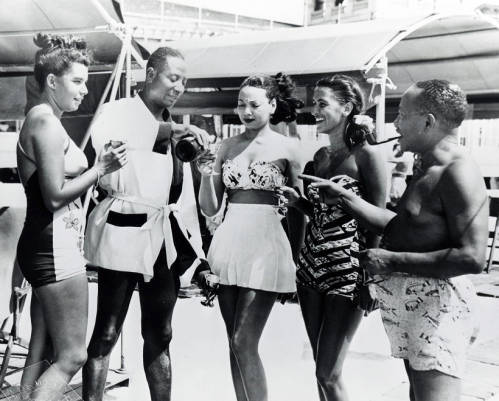[Group of people having cocktails on the beach]
Item
-
Title
-
[Group of people having cocktails on the beach]
-
Description
-
Charles L. Blockson Afro-American Collection: Chicken Bone Beach was the segregated section for African Americans on Atlantic City's beach area. Between 1900 and the early 1950s, African Americans were socially restricted to use the Missouri Avenue Beach Area. Since many vacationing Black families arrived with chicken-laden hampers, the strip became affectionately named “Chicken Bone Beach”.
-
Chicken Bone Beach
-
In this photo, the smiles, gestures, and shared drinks convey joy, confidence, and style—hallmarks of mid-century Atlantic City’s Black beach culture. It is a snapshot not only of leisure but also of a community asserting its presence and celebrating life against the backdrop of one of America’s most iconic seaside resorts.
“Chicken Bone Beach” (also dubbed “Sunshine Row” by showgirls or simply “the place to be”) of which was famously popular and frequented by local and visiting families of all classes, celebrities, entertainers, and politicians in and of the Black community (Hart 2022; Stephens 2014; UMBC Interdisciplinary CoLab, n.d.). It was a place of fun, rest, resilience, pride, and leisure. It is said that fried chicken was eaten frequently and the leftover bones buried in the sand, hence the name “Chicken Bone Beach” (Hart 2022; Stephens 2014). The beach location, and other hot spots including Kentucky Ave in the surrounding area at the time, can be viewed below, courtesy of University of Maryland, Baltimore County (see “Chicken Bone Beach”). From the early 1900s until the passing of the Civil Rights Act of 1964, the beachfront accessible from Missouri Avenue was the only space that African Americans were permitted to use due to segregation and the desire of resort/hotel owners to restrict African Americans from their beachfront properties (Hart 2022; Rosenberg 2022; Stephens 2014).
This photo is part of the John W. Mosley Collection at the Charles L. Blockson Afro-American Collection at Temple University Libraries, of which was acquired in the late 1980s from the Mosley family (Hart 2022). John W. Mosley (1907-1969) was a Philadelphia-area African American photographer who photographed many prominent figures, places, and culture between the segregation period of the 1930s to the Civil Rights Movement of the 1960s (Temple University Libraries). He moved to Philadelphia in 1934, and photographed frequently in Atlantic City, NJ amongst other areas in the region.
-
Rights
-
This material is subject to copyright law and is made available for private study, scholarship, and research purposes only. For access to the original or a high resolution reproduction, and for permission to publish, please contact Temple University Libraries, the Charles L. Blockson Afro-American Collection (blockson@temple.edu; 215-204-6632).
-
Creator
-
Mosley, John W.
-
Format
-
Image
-
Spatial Coverage
-
Atlantic City, NJ
-
Publisher
-
Temple University Libraries, Charles L. Blockson Afro-American Collection
-
Contributor
-
Temple University Libraries, Charles L. Blockson Afro-American Collection
-
Identifier
-
BPA001X0319500000065
-
Date Created
-
(c. 1950's)
-
Is Part Of
-
John W. Mosley Photograph Collection
-
Subject
-
African American women
-
Atlantic City (N.J.)
-
Leisure
-
Bathing suits
-
Hotels--New Jersey
-
Fashion--African American influences
-
African American men
-
Photography
-
Mosley, John W., 1907-1969


